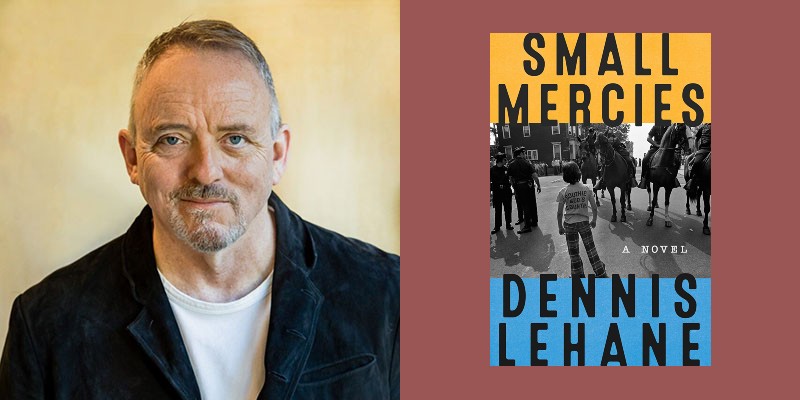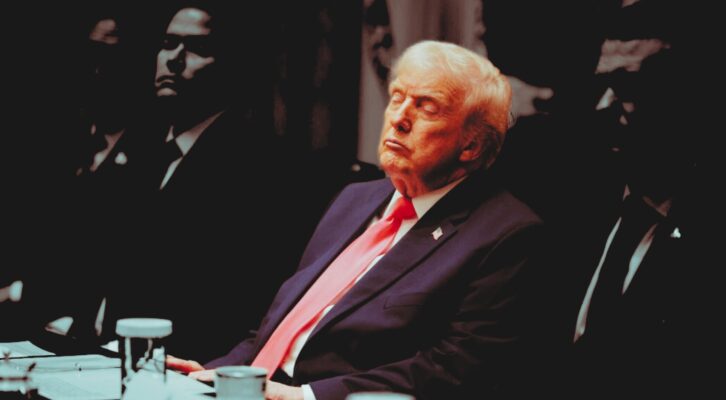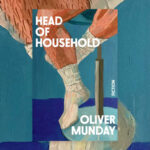Few writers are so inextricably linked to a place as Dennis Lehane is to Boston. For many, he’s come to define the modern understanding of the city, its people, and its tragedies. But it’s been a while since he gave us a Boston book. Lehane has been busy writing for TV and most recently, showrunning Black Bird. This month, the wait is over. Lehane is back with a powerful new novel that takes on one of the city’s most turbulent moments: the desegregation of public schools by busing. Small Mercies follows a mother’s journey as she searches for her missing daughter in the dangerous days leading up to the start of school in 1974. Before the book’s release, I talked with Lehane about returning to Boston and why his memories of that fateful summer have remained so vivid for so long.
Murphy: Where did this book start for you? It feels like the kind of story that’s been building inside you.
Lehane: The memory of that summer, the summer of 1974, has been with me for a long time. I was just looking for the right story. There are several stories in the book that were inspired by true incidents, so I cobbled those together and connected the dots through Boston’s violent past.
And when Mary Pat came into my head, and I was off to the races.
Murphy: How did she first come into focus?
Lehane: I had been wanting to write Mary Pat for a long time. I knew women like her growing up. I knew them well, and I knew they were rare. The first image I had in my head was her beating the shit out of her daughter’s boyfriend in a bar. I could just see that moment. Women like this, you’re going to need an army to pull them off someone. So that’s where it started.
And then a couple years ago there was a story about a woman in Mexico who went after three guys connected to a cartel who were involved in the death of her daughter. She brought them all to justice, even though the cartel made it really clear they were going to kill her if she kept at it. I thought, that’s something: what would Mary Pat be like if you took everything she had?
She was an avenging angel, moving through those heady, violent days leading up to the first day of forced buses. I wanted to use a pulp engine to look at a larger story.
Murphy: It’s hard to imagine, as a writer, a parent, sitting with that idea for so long: losing a child.
Lehane: I have daughters, and I adore them. It’s like my heart is living outside my body. I don’t know why I did it, why I chose to write about this, but I think it was all tied into this: the book is a raging howl against racism. The utter stupidity of racism, how profoundly destructive it is to every single person, including the racist. I think by looking at something so tragic, so unimaginable as losing your daughter, it fueled the rage, and this book is about rage. It was my rage, too.
Murphy: It sounds like the busing summer in Boston has been a real preoccupation of yours over the years. But you’re only coming at it now.
Lehane: The first project that brought me out to L.A. was actually a proposed TV series about bussing in Boston. So yes, it’s something that’s been with me.
Now, there are two distinctions worth noting when we talk about what happened in Boston that summer. One is that desegregation was an unequivocal necessity, an unequivocal good. Another is about forced busing—was that the method by which to do it? That’s the open question.
But did desegregation need to happen, and did it need to happen right then? The answer is yes.
Murphy: In this story, the geography of the neighborhoods is so specific, so important: the differences a few miles, a few blocks, and what that can make for a person’s world.
Lehane: There’s a hell of a biography to be written about Arthur Garrity, the judge who signed the order to desegregate Boston public schools. One thing lost to history, which I think is tragically sad, is that he was moving ahead to prepare the order on busing at a county wide level, so it was supposed to impact the suburbs and the city. In the end, the powers that be came along two months before his order was due to be released and said, ‘yeah no it’s just gonna be the city. It’s just gonna be the poor neighborhoods.’
Murphy: How did that work? I don’t know that part of the history.
Lehane: That’s what’s so stunning. I had forgotten that distinction, too. I did very little research on this book. Most of it was just sort of trying to deal with my recollections, which are extremely vivid. But when I did get into some of the research, I discovered that they came along at the last minute and carved out the suburbs. It wouldn’t even effect Suffolk County, only the public schools in the city of Boston, which was mostly working class: African-American, Irish, Italian working class. Those schools were chosen to be the pivotal part of the social experiment. That’s why there’s one legitimate part of it that was non-racist, which got wrapped up with all the racism, which was this feeling: ‘Hey wait a second, why do you guys come in and once again tell us poor neighborhoods how it’s gonna be?’
As someone who grew up in Dorchester, this was familiar. You know, very few people realize Dorchester is on the ocean. The reason very few people realize that is because in the 1960s, without anyone asking us, they rerouted all plans for a major expressway straight through the heart of Dorchester. They cut us off from the ocean. That was the kind of history present in those neighborhoods when they came in and said, ‘now we’re gonna tell you where your kids are gonna go to school.’ I think that’s where the non-racist rage comes from. Then, as you can see in the book, there’s also just the staggering level of racism that existed not only in South Boston, but all over the city of Boston.
Murphy: You mentioned your recollection of that summer was vivid. How did you trace back to those memories?
Lehane: This one was like opening a vein. It just flowed out, under extremely stressful circumstances. I was running a television show at the time, my first, and I was running it on location in southern Louisiana at the height of Covid, in ungodly heat, with a million daily lightning strikes, and my brain, just in order to bifurcate, or to find some release from that, started writing this book.
Murphy: A few years back, around the time your last novel came out, you were really open about your aspirations to become a showrunner. Now that’s happened. TV writing is a big part of your life. Did that seep into the way you approached the book. Or was the novel a refuge?
Lehane: A lot of writers—certainly I can now understand this part of my psyche—become writers because it’s a way to escape from pressure. You can go to another planet, another country, wherever you want to go in your head, to get away from whatever’s not working in your daily life.
If I’m stressed out about anything, my first reaction, as soon as I can break away, is to go write something. It’s a refuge for me. That’s exactly what happened with this book. By the time I got to the end of it, I felt like I’d purged something.
Murphy: Is your heart still in TV writing? Did this book make you want to dedicate yourself more to the novels?
Lehane: With novels, if I do write another one, I want it to come from exactly the place this one came from. It was a need. It had to come out of me. That’s the way the best books are usually written. I only want to feel that from now on. There’s no compelling reason for me to continue writing novels unless it’s that.
With the screenwriting, showrunning, look, I was running a TV show, and every single thing was going wrong. I was where the buck stopped, and I had to deal with every question, every issue, and treat those issues with the respect they deserved. I was dealing with all that, and several things went really badly wrong. Every TV show is a war. But even on the darkest day, I remember where I was, standing in my trailer, trying to deal with a crisis, and I thought, ‘Yeah, but it’s better than the middle of a book.’ The middle of a book is brutal and lonely and you’ve got no friends in the trenches with you. It’s not just that a book is harder than a script. It’s harder than running a television show.
Murphy: Your work has really come to define Massachusetts crime fiction for a lot of us. Obviously, there was a generation before, with George V. Higgins or Robert B. Parker, but for modern readers and audiences, their vision of that Boston tradition largely comes from you. So bringing yourself back to write another Boston novel, a really big, intense Boston novel, was there any special pressure to it? Any feeling that there’s a responsibility there?
Lehane: Look, there are so many things I’ve done that have not been the smart move in terms of my career. I’ve taken massive amounts of time off between books. I haven’t written the same books over and over again. I don’t really have a brand: except Boston, and it’s going to be dark. I peaked around 2003 with Shutter Island, in terms of sales, recognition, any attempt to create a brand. So, I’m always writing from the perspective of, ‘boy I hope somebody reads this.’ I don’t think of how my work is perceived and what my reputation is, although there seems to be something about this book, so far, where people are taking it as a reason to do a retrospective of my career. Which, you know, makes my daughters laugh. There’s that line in Chinatown, from John Huston’s character: “Politicians, ugly buildings, and whores all get respectable if they last long enough.” You know what I mean? I feel like I’m at that stage of my career right now with this book.

















